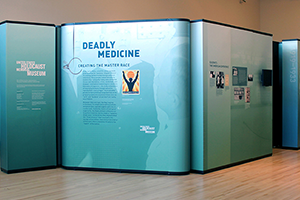Lombardo Assists on Holocaust Exhibition
Georgia State Law Professor Paul Lombardo consulted on a traveling exhibition produced by the United States Holocaust Memorial Museum.
 The exhibition, "Deadly Medicine: Creating the Master Race," is on display at the Schmidt Center Gallery at Florida Atlantic University in Boca Raton, Fla., through Sunday, Feb. 16.
The exhibition, "Deadly Medicine: Creating the Master Race," is on display at the Schmidt Center Gallery at Florida Atlantic University in Boca Raton, Fla., through Sunday, Feb. 16.
Lombardo, a eugenics expert and historian, provided the introductory lecture on the early 20th century practice of eugenics in the United States when it opened in December. "The exhibition is a view through the window of the Holocaust that brings us back to looking at America," says Lombardo, senior adviser to the Presidential Commission for the Study of Bioethical Issues.
Rosanna M. Gatens, professor and director for the Center for Holocaust and Human Rights Education at Florida Atlantic University, says Lombardo's lecture was an essential kickoff to the exhibition opening.
"We invited him because of his expertise in the history of the eugenics movement and because he was a critical consultant to the United States Holocaust Museum curator and staff when the exhibition was being developed," Gatens says.
Lombardo has consulted on the exhibition since it first opened in 2002 at the United States Holocaust Memorial Museum in Washington, D.C.
"In the original exhibition, one of the first things you saw were public health service officers doing IQ tests at Ellis Island and excluding people based on inferiority," Lombardo says. "It also exhibitioned the saga of the Supreme Court Buck v. Bell decision, the American experience and eugenics and how that later affected and played out in Europe. People never connected what happened in the Holocaust and what happened in America."
The exhibition then traveled, making stops in Germany and Israel. When the exhibition returned to the United States, Lombardo served as a consultant or speaker for exhibitions at the Andy Warhol Museum in Pittsburgh, the Centers for Disease Control and Prevention in Atlanta, Harvard University and Texas Tech University.
Lombardo has dedicated decades of his career to studying the U.S. Supreme Court's 1927 Buck v. Bell decision and how it impacted the practice of eugenics. His book, "Three Generations, No Imbeciles: Eugenics, the Supreme Court and Buck v. Bell," chronicles Buck's case in which the Court upheld laws allowing states to perform sterilization surgeries to prevent "feebleminded and socially inadequate" people from having children.
Lombardo says the Buck decision set the stage for more than 60,000 operations in the United States and was cited at the Nuremberg trials in defense of Nazi sterilization experiments. To date, the case has never been overturned. He says it's a troubling precedent in the human genome era.
Deadly Medicine moves to the University of Maryland in Baltimore in late February.